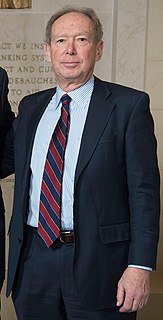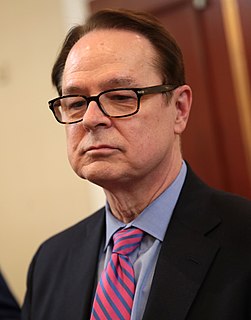Цитата Барни Фрэнка
Эти две организации, Fannie Mae и Freddie Mac, не сталкиваются с каким-либо финансовым кризисом. Чем больше люди будут преувеличивать эти проблемы, чем больше будет давление на эти компании, тем меньше мы увидим в плане доступного жилья.
Связанные цитаты
Fannie Mae и Freddie Mac — две раздутые и коррумпированные программы, спонсируемые государством, — в значительной степени способствовали кризису. Чтобы предотвратить новый кризис, нам нужно сделать то, что мы должны были сделать много лет назад, — реформировать Fannie Mae и Freddie Mac. Мы также должны отменить Додд-Франк, неудавшееся решение демократов. При Додде-Франке 10 банков, слишком больших, чтобы обанкротиться, превратились в пять банков, слишком больших, чтобы обанкротиться. Тысячи местных банков прекратили свою деятельность.
Эти государственно-частные партнерства очень и очень опасны. Самая прогнившая часть финансовой системы США состояла из спонсируемых государством компаний Fannie Mae и Freddie Mac. Они действительно начали этот кризис. Государство должно устанавливать правила и обеспечивать их соблюдение, но не быть участником рынка.
RE: GSE, такие как Freddie Mac и Fannie Mae: «Кредиторы будут продолжать недооценивать риск этих финансовых учреждений, перефинансировать их и не в состоянии обеспечить эффективную рыночную дисциплину Столкнувшись со слишком низкими ценами, системно важные фирмы будут брать на себя слишком много. риск».
В сентябре 2008 года две крупнейшие ипотечные компании под названием Fannie Mae и Freddie Mac, которые были спонсируемыми государством предприятиями и держали ипотечные кредиты на сотни миллиардов долларов, из-за убытков, которые они понесли по ипотечным кредитам, фактически стали неплатежеспособными, и правительству пришлось взять их на себя.
Существует много обвинений в пузыре на рынке жилья в США, но не так много из них принадлежит Fannie Mae и Freddie Mac. Два гигантских жилищно-финансовых учреждения за десятилетия допустили множество ошибок, некоторые из которых были настоящими колоссальными, но среди них не было причин, из-за которых цены на жилье взлетели, а затем резко упали в течение последнего десятилетия.
Одна треть из 15 триллионов долларов ипотечных кредитов, существовавших в 2008 году, принадлежит или секьюритизирована Fannie Mae, Freddie Mac, Ginnie Mae, Федеральному жилищному управлению и Управлению по делам ветеранов. Покупатели переупакованных кредитов с Уолл-стрит не возражали против покупки рискованных бумаг, потому что они предполагали, что они будут гарантированы федеральным правительством: читай спасение от налогоплательщиков. Сегодняшний жилищный бардак можно свалить прямо к ногам Конгресса и Белого дома.
У нас есть идея сказать, что это накладывает ограничения на спасение, чтобы спасение не происходило в будущем, чтобы нам не приходилось делать - смотреть на ситуации с AIG, ситуации с Bear Stearns, Fannie Mae или Freddie. Mac, что, вероятно, будет больше денег, потраченных на эти два учреждения, чем Конгресс потратил на программу TARP.
































